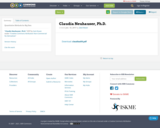
Quantitative Methods for Big Data
- Subject:
- Applied Science
- Material Type:
- Reading
- Date Added:
- 08/01/2016

Quantitative Methods for Big Data

Foundations of Biomedical Science: Quantitative Literacy Theory and Problems is designed to help students develop the fundamental mathematical and quantitative literacy required to navigate and interpret evidence-based Biomedical data. This will provide students with the skills and confidence to habitually question any quantitative data they come across and to use these skills to make informed judgements regarding their veracity.

The primary purpose of this seminar is to enable students to craft approaches to so-called “First World”/ “Third World” city comparisons that are theoretically sophisticated, methodologically rigorous, contextually grounded, and significantly beneficial. Since there exists very little literature and very few projects which compare “First World” and “Third World” cities in a sophisticated and genuinely useful manner, the seminar is structured around a series of readings, case studies, and discussions to assist students in becoming mindful of the potential and pitfalls of comparative analysis, the types of data, the methods of analysis, and the urban issues or sectors which may benefit the most from such approaches. The course is designed to be interdisciplinary and interactive, and is geared towards masters and doctoral students.
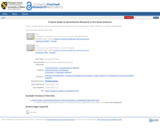
This resource is intended as an easy-to-use guide for anyone who needs some quick and simple advice on quantitative aspects of research in social sciences, covering subjects such as education, sociology, business, nursing. If you area qualitative researcher who needs to venture into the world of numbers, or a student instructed to undertake a quantitative research project despite a hatred for maths, then this booklet should be a real help.
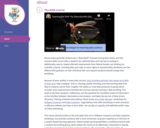
RQM is a research methods course that focuses on modernizing the post-data collection portion of the scientific workflow. The course takes an approach that produces both conventional research products and trains students to make their work more efficient and reproducible. This handbook provides a framework for professors who would like to teach a 14-week class on reproducible quantitative methods, presuming an understanding of open workflows for publication, some intermediate R or (other command-line based data analysis software) skills, and basic GitHub operations and use.
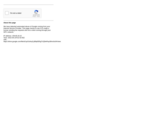
This book is based on two open-access textbooks: Bhattacherjee’s (2012) Social science research: Principles, methods, and practices and Blackstone’s (2012) Principles of sociological inquiry: Qualitative and quantitative methods. I first used Bhattacherjee’s book in a graduate-level criminal justice research methods course. I chose the book because it was an open educational resource that covered the major topics of my course. While I found the book adequate for my purposes, the business school perspective did not always fit with my criminal justice focus. I decided to rewrite the textbook for undergraduate and graduate students in my criminal justice research methods courses. As I researched other open- educational resources for teaching social science research methods, I found Blackstone’s book, which covered more of the social science and qualitative methods perspectives that I wanted to incorporate into my book.
As a result, this open-access textbook includes some content from both previous works along with my own additions based on my extensive experience and expertise in conducting qualitative and quantitative research in social science settings and in mentoring students through the research process. My Ph.D. is in Sociology, and I currently teach undergraduates and graduate students in a criminal justice program at Weber State University. Throughout my career, I have conducted and published the results of research projects using a variety of methods, including surveys, case studies, in-depth interviews, participant observation, content analysis, and secondary analysis of quantitative data. I have also mentored undergraduates in conducting community-based research projects using many of these same methods with the addition of focus groups and program evaluations.
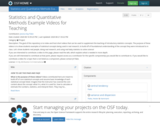
The goal of this repository is to index and host short videos that can be used to supplement the teaching of introductory statistics concepts. The purpose of these videos is to show students examples of statistical concepts being used in real research, to build off of foundational understanding of the concept they were introduced to in class. Let's show students real people, doing real research, and using real baby statistics to solve science! If you are interested to contribute a video to this page, please read the wiki, which explains what is needed in more depth. If you are still interested to contribute at that point, please request access as a contributor for the specific component(s) you would like to contribute to. If you would like to contribute a video for a topic that is not listed as a component, please contact JK Flake.